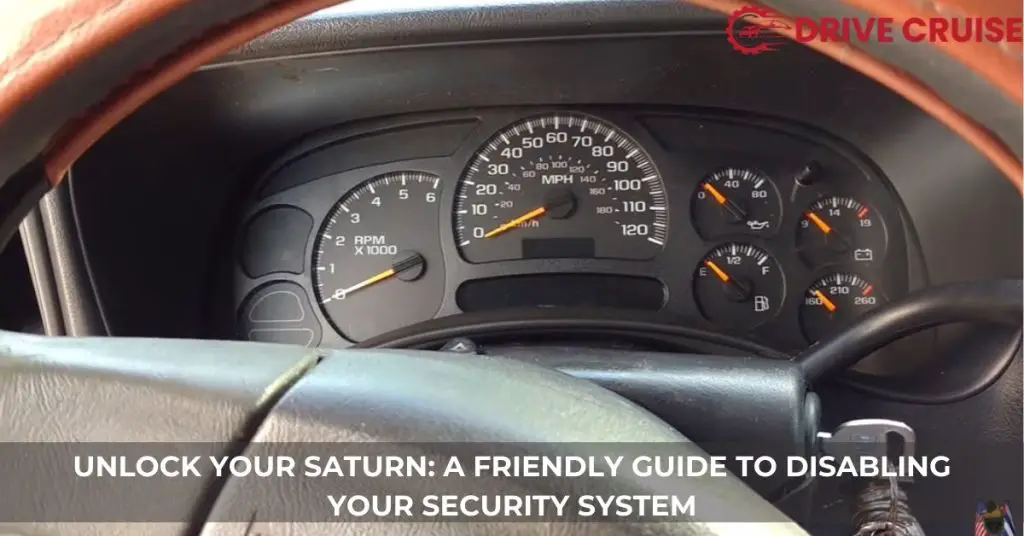Dealing with a finicky security system in your Saturn can be more than a little frustrating. Whether it’s a persistent alarm that won’t quit or a system that’s become more of a hindrance than a help, we’ve all been there at one point or another. It’s enough to make you wish for a simpler time when car keys were just… keys.
But don’t worry, we’ve got your back. Disabling the Saturn security system might seem like a daunting task, but it’s actually more straightforward than you might think. With a few simple steps, you’ll be on your way to a more peaceful car experience, free from the constant beeping and unnecessary alerts. Let’s dive into how you can regain control of your vehicle’s security, shall we?
Understanding the Saturn Security System
Building on our earlier discussion about the annoyances related to the Saturn vehicle security system, it’s essential to grasp the basics of how this system operates. Recognizing the components and their functions paves the way for a successful deactivation process. The Saturn security system, designed to prevent unauthorized vehicle entry and start, primarily comprises a few key elements: the alarm, the immobilizer, and the remote key fob.
The alarm serves as the first line of defense, emitting a loud sound when it detects unauthorized access attempts. Its main components include sensors on doors, the trunk, and the hood, which trigger the alarm if disturbed when the system is armed.
The immobilizer, a more silent guardian, prevents the engine from starting unless the correct key is used. It works by communicating a unique code from the key to the vehicle’s onboard computer, ensuring the car starts only with a recognized key.
Lastly, the remote key fob allows for convenient remote control of the security system, including arming and disarming the alarm and, in some models, even starting the car remotely. It’s this key fob that often holds the solution to disabling the troublesome aspects of the system.
Understanding these components, we see how each plays a vital role in the vehicle’s security. However, when one desires a more simplistic approach, knowing how to navigate these elements becomes crucial. Our focus is to guide you through disabling the system, should you find its features more cumbersome than protective. Let’s dive into the steps necessary to achieve a serene driving experience, free from the hassles of an overzealous security system.
Reasons to Disable the Security System
Understanding the components of the Saturn security system sets the stage for exploring why someone might want to disable it. Each reason corresponds to the challenges and intricacies we’ve identified, offering insights into the pursuit of a more serene vehicle experience.
- Frequent False Alarms: False alarms occur when the security system mistakenly identifies a non-threat as a threat. Saturn owners might experience these alarms going off due to sensitive sensors, leading to unnecessary stress and disturbance in their lives.
- Malfunctioning Key Fob: A key fob that’s not working correctly can prevent owners from disarming the security system, leaving them unable to start their car or stop the alarm. Disabling the system can serve as a temporary fix while seeking a more permanent solution.
- Battery Drain Issues: Security systems, especially those with alarms, can drain the car’s battery if they are triggered frequently or malfunction. Turning off the system can help preserve battery life, especially for those who rely heavily on their vehicle for daily tasks.
- Simpler Vehicle Operation: Some Saturn owners prefer simplicity and might find the advanced security features more cumbersome than helpful. Disabling the system allows for a straightforward approach to using their car without navigating through security protocols.
- Cost of Repairs: Repairing or replacing components of the security system, such as the immobilizer or the key fob, can be costly. For older models, the expense might not justify the benefit, leading owners to consider disabling the system as a cost-effective measure.
- Planning Vehicle Modifications: Enthusiasts looking to modify their Saturn may find the security system interferes with new installations or upgrades. Disabling it can facilitate smoother modifications without triggering alarms or immobilizing the vehicle unnecessarily.
Each of these reasons aligns with the desire to reduce the complexities and disturbances highlighted earlier, catering to personal preferences or circumstances that make disabling the Saturn security system a considered choice.
Step-by-Step Guide on How to Disable the Saturn Security System
Understanding the need for some Saturn owners to disable their vehicle’s security system, whether due to frequent false alarms, battery drain issues, or simply seeking a simpler vehicle operation, we delve into the specifics of how to achieve this task. The process varies depending on the model of the Saturn, but here’s a general guide to help owners:
- Locate the Fuse Box: The first step involves locating the fuse box inside your Saturn. Most models have the fuse box situated under the dashboard on the driver’s side. In some cases, there may be a secondary fuse box under the hood.
- Identify the Security System Fuse: Utilizing your Saturn’s owner’s manual, identify the fuse associated with the security system. The manual should provide a diagram indicating the fuse’s exact location.
- Disconnect the Battery: Before proceeding, disconnect the vehicle’s battery to prevent any electrical shocks or short circuits. Ensure the ignition is off and remove the negative battery cable.
- Remove the Security System Fuse: With the battery disconnected, locate and carefully remove the fuse designated for the security system. This action will disable the system.
- Test the System: After removing the fuse, reconnect the battery and test the vehicle to ensure the security system is disabled. This can involve checking if the alarm activates when the doors are unlocked or opened.
- Consult a Professional: If you’re unsure or uncomfortable performing these steps yourself, or if the security system does not disable after following these steps, consult a professional mechanic. Certain Saturn models might have a more complex security system that requires specialized knowledge to disable.
Disabling the Saturn security system should be approached with caution, as it affects your vehicle’s security and may impact insurance coverage or vehicle warranty. Always consider the implications and consult with professionals if in doubt. Through these steps, our goal is to provide information that bridges the gap between the need for a less complex vehicle operation and maintaining the integrity of your Saturn’s security features.
Pros and Cons of Disabling the Security System
In our journey to simplify the operation of Saturn vehicles by disabling the security system, it’s crucial we consider the benefits and drawbacks of taking such a significant step. This process, while solving certain issues, comes with its unique set of advantages and disadvantages.
Advantages
- Eliminates False Alarms: One of the primary benefits of disabling the Saturn security system is the elimination of false alarms. Owners who frequently encounter false triggers find relief as disabling the system prevents these unnecessary disruptions.
- Saves Battery Life: Disabling the security system can contribute to saving the vehicle’s battery life. The system, when active, continuously monitors various sensors, which, over time, can drain the battery. Deactivation helps conserve energy, especially in vehicles that are not used daily.
- Simplifies Vehicle Operation: For individuals seeking a more straightforward vehicle operation without the need for managing alarm systems, disabling the security offers a solution. It allows for a simpler car use experience, particularly for older models where the technology might not be as reliable.
- Increases Theft Risk: The most significant downside to disabling the Saturn’s security system is the increased risk of theft. The security system acts as a deterrent to potential thieves, and its absence may make the vehicle an easier target.
- Potential Insurance Impact: Certain insurance companies might adjust premiums or policy terms for vehicles without a functioning security system. Vehicle owners could face increased costs or complications in securing comprehensive insurance coverage.
- Warranty Concerns: For newer Saturn vehicles still under warranty, disabling the security system might void certain warranty protections. It’s advisable to check with warranty guidelines before proceeding with system deactivation.
In navigating the balance between simpler vehicle operation and maintaining security integrity, it’s imperative that Saturn owners weigh these pros and cons. Consulting with a professional or insurance provider can offer additional insights tailored to specific circumstances, helping to make an informed decision.
Alternatives to Disabling the Security System
After understanding the implications of disabling the Saturn security system, exploring alternatives that maintain security without the accompanying hassles becomes essential. Here are some options we’ve found effective:
Adjusting Sensitivity
Many alarm systems allow for sensitivity adjustments. Reducing the trigger threshold can minimize false alarms due to minor disturbances, such as a passing vehicle or a cat moving nearby.
Upgrading the Alarm System
Replacing the factory alarm with a more advanced system offers better control over security features. Modern alarms come with customizable settings, smartphone integration, and lower false alarm rates.
Implementing Mechanical Locks
Adding mechanical locks, such as steering wheel locks or brake pedal locks, provides an extra layer of security. Thieves often look for quick wins, and visible mechanical locks can deter theft attempts.
Using GPS Trackers
Incorporating GPS trackers into your vehicle doesn’t prevent theft but helps in the recovery of a stolen car. Some trackers offer real-time tracking and can be monitored through mobile apps.
Consulting a Professional
For Saturn owners unsure about the best course of action, consulting with an automotive security professional offers personalized recommendations. Professionals can suggest the most suitable security enhancements based on the specific model and owner’s needs.
By considering these alternatives, Saturn owners can enhance their vehicle’s security without disabling the system entirely, thus avoiding potential complications with insurance, warranty, and theft risk. Each option has its benefits, and weighing them against your needs ensures the best protection for your vehicle.
Conclusion
We’ve walked through the steps and considerations for disabling your Saturn’s security system. While it might seem like a straightforward solution to certain issues, it’s important to weigh the pros and cons carefully. If you decide against disabling, remember there are several alternatives that can enhance your vehicle’s security without the drawbacks. Whether it’s adjusting the system’s sensitivity or consulting with a professional, we hope you find the right balance between security and convenience. Remember, your car’s safety and your peace of mind are paramount.
Related Posts:




































